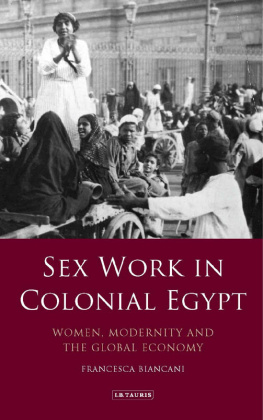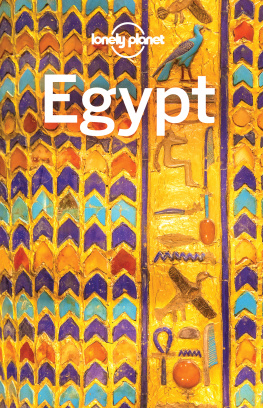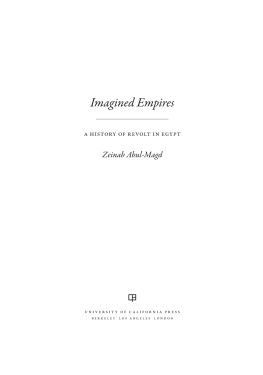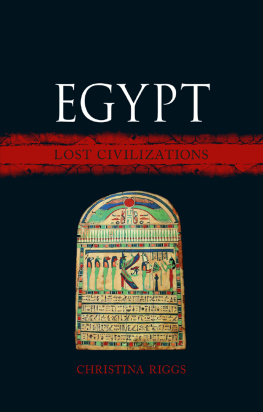Francesca Biancani is Adjunct Professor of History and Institutions of the Modern Middle East in the Faculty of Political Science of Bologna University. She is also Postdoctoral Fellow at the French Institute for Oriental Archeology (IFAO) and the Centre d'tudes et de documentation conomiques, juridiques et sociales (CEDEJ) in Cairo.
Francesca Biancani exhibits a knowledge of Egyptian history that begins in the eighteenth century and extends to the uprising of the Free Officers, thereby indicating her grasp not only of Egyptian history but also of a new development in the history of Egypt, namely, the appearance of prostitution, i.e. sex work, as the portal of modernity. Biancani should also be commended for the use of the archives and their contribution to the volume. Readers of the book will be rewarded with a finely written and researched historical volume. Non-specialists of Egyptian history will find much to engage with as well.
Mary Ann Fay, Associate Professor of History,
Morgan State University; author of Unveiling the Harem:
Elite Women and the Paradox of Seclusion in Eighteenth-Century Cairo
Sex Work in Colonial Egypt is engaging, informative and offers readers a glimpse into the lives of women whose experiences have largely been unaccounted for in historical literature. There is a great deal to learn here about the structure of colonial rule in Egypt, and British and Egyptian constructions of race and racial hierarchies; the book demonstrates exactly how both local and colonial anxieties were inscribed on the bodies of Cairo's sex workers.
Lisa Pollard, Professor Emerita, University of North Carolina
Wilmington; author of Nurturing the Nation: The Family Politics of
Modernizing, Colonizing and Liberating Egypt, 18051923

Published in 2018 by
I.B.Tauris & Co. Ltd
London New York
www.ibtauris.com
Copyright 2018 Francesca Biancani
The right of Francesca Biancani to be identified as the author of this work has been asserted by the author in accordance with the Copyright, Designs and Patents Act 1988.
All rights reserved. Except for brief quotations in a review, this book, or any part thereof, may not be reproduced, stored in or introduced into a retrieval system, or transmitted, in any form or by any means, electronic, mechanical, photocopying, recording or otherwise, without the prior written permission of the publisher.
Every attempt has been made to gain permission for the use of the images in this book. Any omissions will be rectified in future editions.
References to websites were correct at the time of writing.
Library of Middle East History 72
ISBN: 978 1 78831 103 8
eISBN: 978 1 78672 483 0
ePDF: 978 1 78673 483 9
A full CIP record for this book is available from the British Library
A full CIP record is available from the Library of Congress
Library of Congress Catalog Card Number: available
To the memory of my beloved father Gianni Biancani, and to
Giovanni and Martino, a concentrate of giggling joy and hope.
LIST OF ILLUSTRATIONS
Figure
Native lady married to a Franc, Vivant Denon (1803), Vol. 1, Table XXXV.
Cairo, Clot Bey Street. Max H. Rudmann, no. 148.(Courtesy of Heather D. Ward.)
Caire, Rue Klout-Bey, dated 1914. (Courtesy of Heather D. Ward.)
Cairo, Fishmarket. Lichtenstern and Harari, no. 71. (Courtesy of Heather D. Ward.)
Table
Number of licensed and unlicensed prostitutes in Cairo, 192146.
ACKNOWLEDGEMENTS
I am very pleased to acknowledge and express my deepest gratitude to those who helped me in many ways during the years I spent working on this project, which slowly morphed from my doctoral dissertation into a book.
First of all I thank my former PhD supervisor, Professor John Chalcraft, for demolishing my original doctoral project in the most gracious and tactful way possible, during our very first supervision meeting. In spite of an initial fit of desperation, I have to thank him for challenging me to think about my project creatively and indicating some points for reflection, from which I developed the core of the present book, almost ten years ago. He believed in the project, encouraged me through the various stages of writing, carefully reading, editing and offering insightful critiques on a number of previous drafts of the manuscript. His analytical acumen and intellectual rigor constituted, and still are today, a powerful inspiration for me. I would like to extend my thanks to my advisor, Dr Sharad Chari, and to Professor Marilyn Booth and Dr Nelida Fuccaro for taking the time to read and thoughtfully comment on several chapters of this work, and in general for their encouragement and kindness. Of course, neither of them should be blamed for any inconsistencies or errors the reader may find in the text, as I am to be considered solely responsible for any shortcoming.
My research was made possible thanks to the generous financial help from a number of institutions I would like to take the chance to acknowledge here: the London School of Economics, the University of London Central Research Fund and the Gibb Memorial Trust.
The project benefited from feedback received at a number of international conferences and workshops, especially at the Middle East Studies Association meetings in 2007, 2009 and 2013, and at the BRISMES in 2014. Particularly important and enriching were the conversations and feedback received during a workshop at the Advanced Studies Institute of the Hebrew University held in Jerusalem in 2012, entitled The Middle East and the First Wave of Globalization, and the fruitful participation in the research project Selling Sex in Global Cities at the International Institute of Social History of Amsterdam in 2013. Likewise, I had the chance to profit enormously from a collaboration experience with Slovenian colleagues at the Slovenian Migration Institute, about the historical case of the aleksandrinstvo.
Archival research for this project has been conducted at various institutions and across three countries: the UK, Egypt and Italy. Moreover, digital documents have been obtained from the Australian War Memorial in Canberra, Australia. In England, I would like to thank the staff of the National Archives in Kew for their help. Generous assistance has been offered also by the staff of the former Women's Library at the Metropolitan University in London. I am indebted to Professor Joel Beinin who welcomed me as fellow at the Institute of Middle Eastern Studies of the American University in Cairo, and who provided institutional support during my field work in Egypt in 2007. I also take the opportunity to express my deepest gratitude to Dr Khaled Fahmy, who endorsed my application to the National Archives in Cairo, making the whole process as quick and smooth as possible. I am grateful for the assistance I received from the staff of the National Archives, especially by Madame Nadia and Madame Nagwa.
Further thanks go to the staff of the Archivio Centrale di Stato in Rome. I owe a particular debt to the keepers of the Historical Archives of the Ministry of Foreign Affairs in Rome, for helping me locate a whole collection of long-forgotten and virtually untapped consular records. As the sources I wanted to consult were not located in the main storeroom, but lay literally abandoned in a nearby annex, inducing the delivery staff to produce the materials I needed required a rather precise combination of diplomacy and determination, with occasional outbursts of anger on my part. I now thank them warmly for their help and cooperation. Moreover, very precious help and logistic support has been offered throughout the years by the Italian Benevolent Society of Alexandria of Egypt, and especially by its President, Mr Francesco Monaco.








